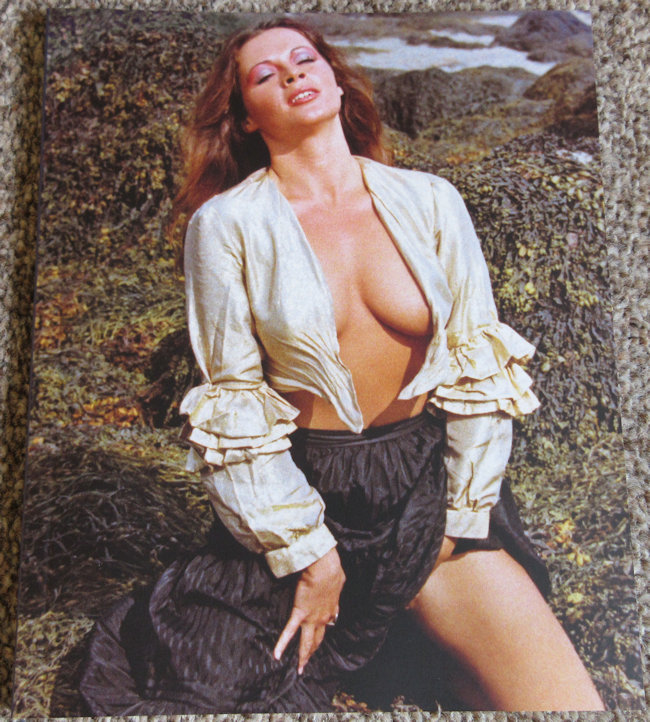Following his infamous series of four vampire films between 1968 and 1972, Jean's output started to vary in thematic tone a little. Aside from the porn films that he was forced to make in order to keep going financially, the trio of 'proper' movies that followed included this supernatural homage to the pirate serials he grew up loving. The Demoniacs (1974) introduces us to a troupe of scruffy, grimy pirates, three guys and a perpetually orgasmic woman (a brilliant Joëlle Coeur, who'd been previously seen in Schoolgirl Hitchhikers). These bandits discover a couple of shipwrecked innocent young women limping in from the ocean. Spotting an opportunity for what they see as chaotic fun, the sadistic bunch proceed to violently assault the two women, leaving them for dead to go about their business of getting drunk and laid (even more) in the local tavern. The two victims, however, seem to survive. On a quest for revenge they elicit the help of a nearby spiritual sorcerer who grants them the powers that they will need.
Probably of little concern here is the plot itself, as with many of Rollin's films - it's more so an excuse to indulge in strange situations, exquisite location work and imagery, peppered with some sexual shenanigans to keep things lively. The opening score is oddly professional, perhaps putting the average viewer into a false sense of expectation. I imagine such expectation would be quickly dashed once the proceedings are underway. The rape sequence(s) are quite unpleasant, the two girls treated horribly by the whole group of pirates. The subsequent morality explorations are strange to the say the least, particularly when the conclusion is taken into consideration (I won't reveal where it goes). In a way though, whilst somewhat unsatisfying on one level, it does result in the offbeat and unexpected that contributes to Rollin's work existing in such a weird, periodically beautiful universe all of its own. Quite long for a Rollin film (depending on which version you watch - see below), The Demoniacs maintains a perverse allure, at the same time different from much of his other work and undefiantly Rollin in personality.
It goes without saying that Powerhouse, with their famed Indicator label, have once again delivered a wonderful definitive edition. Most amazingly, they've compiled three versions of the film. Probably the most recommended is the theatrical version, which runs 100 minutes, followed by a more explicit export version (109 minutes), as well as the trimmed-down Curse of the Living Dead version, 86 minutes. The limited edition Ultra-HD disc (also available as a Blu-ray), 1.85:1 framed, looks astounding compared to the previous Blu-rays and especially DVDs, utilising as it does the negative for the restorations and treated with great respect as a piece of 35mm. Digital restoration has come such a long way even in ten years, and what once looked exemplary is now put into the shadows by comparison (although the Redemption releases were excellent for the time, and still pleasing to watch). Obviously the mono-audio derived language is French with newly translated English subtitles (aside from Curse..., which is English dubbed).
The disc is packed with commentary material and interviews, the best on-disc extra being a forty-minute appreciation by Stephen Thrower - he has a knack for weeding out what makes moving art good, identifying rationale that enlightens even long-term fans such as myself, and he does a better job of explaining why Rollin's work is so relevant in the world of cinema than I could ever do myself. I'd even suggest it's a good starting point for those new to Rollin, so that the initially perplexed response can be put into perspective as the open-minded viewer sees the beauty beneath the layers that are at odds with what he/she conventionally defines as good film-making.
The gorgeous bundled book contains a range of material. Firstly an essay from the critic Alexandra Heller-Nicholas, a person who appears to be generally hung up on gender politics and (here, as well as in other published work) peculiarly obsessed with rape-revenge concepts. My theory is that in an ideally civilised world, where feminists could not really justify treating men like the worthless sub-humans that they see them to be, the act of rape gives these dogmatic individuals the excuse they need to unleash their unmasked contempt. In spite of this the essay is not too psychotic...
Much better is a brilliant overview of Rollin's career, followed by late-life interview with the director - this was produced by Mike Lebbing for the legendary Encore DVD releases in the noughties. There's also a very welcome, at times bizarre, making-of recollection essay by Rollin himself, outlining the difficulties of the shoot, thoughts on the actors, etc. These are great inclusions, and conclude with an interview with Monica Swinn, one of the tavern denizens in the film. As with the previous Rollin releases from Indicator, the book and disc case are held within a hard-box outer case. All very luxurious in quality, I hope they continue this for the rest of the Jean Rollin editions.



